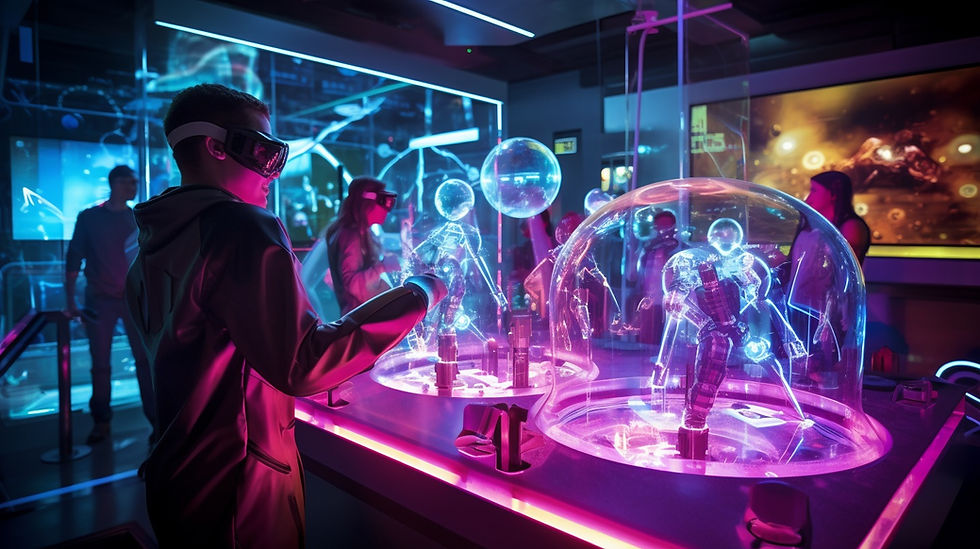AI Education in New Zealand Schools: A Guide for Teachers
- Bot Bot
- Aug 28, 2023
- 4 min read
How to turn your everyday boring teacher into a SUPERHERO with magical AI skills.

As the new school term kicks off in Aotearoa, there's a pressing need to address the lack of coherent guidelines around the use of Artificial Intelligence (AI) in educational settings. The absence of such policies isn't just a minor oversight; it's a significant issue that could impact both teaching methods and student outcomes.
Check out this ChatGPT for Kiwi Teachers Workbook from our mates over at Avant Consultants Ltd
Why defining a school's AI position matters:
From what we've gathered, many New Zealand schools are entering the academic year without a well-defined AI strategy. This lack of planning can lead to confusion and even disruption in the classroom, affecting both teachers and students negatively.

The Current AI Education Landscape:
Teachers and school administrators are in a challenging position. They're dealing with rapidly evolving technology that has the potential to disrupt traditional educational norms. It's unreasonable to expect them to navigate this complex landscape without proper guidance.
Existing AI policies are often vague and inconsistent. Some schools advocate for AI's potential to enhance educational outcomes, while others caution that its misuse could lead to disciplinary action. The lack of clarity leaves room for misinterpretation and uneven application.
Alarmingly, many schools have no AI policies at all. Considering that students are already using AI tools for various purposes, the absence of formal guidelines leaves schools ill-prepared to manage the technology's impact effectively.

20 Practical ChatGPT Prompts for Teachers to Create Epic Classes
"Generate a list of engaging discussion questions on [Topic] for my Year 9 class."
"Create a fun quiz on New Zealand history for primary school students."
"Help me draft an interactive lesson plan on climate change for Year 11 students."
"Provide a step-by-step guide on setting up a virtual classroom using AI tools."
"Generate a list of creative writing prompts for my English class."
"Create a debate format for discussing ethical implications of AI in society."
"Help me design a project that combines Maths and Computer Science for Year 13 students."
"Generate a list of Te Reo Māori vocabulary words relevant to a Science class."
"Provide tips for integrating AI tools into traditional classroom settings."
"Help me create a reading list that includes diverse perspectives for my Social Studies class."
"Generate a list of hands-on activities for teaching coding to primary school students."
"Provide a guide for teaching students how to evaluate online sources for credibility."
"Help me design an assessment rubric for a group project on renewable energy."
"Generate a list of interactive online resources for learning Geometry."
"Create a lesson plan that incorporates AI-generated content to teach New Zealand geography."
"Provide a list of questions to stimulate critical thinking in a Philosophy class."
"Help me draft a letter to parents explaining the role of AI in our classroom."
"Generate a list of fun and educational games that can be played in a virtual classroom."
"Provide a guide for teaching students about data privacy and online safety."
"Help me create a classroom activity that teaches the importance of teamwork using AI tools."

Honouring Te Ao Māori: The Importance of Local Human Context
In New Zealand, the conversation around AI in education isn't just about technology; it's also deeply rooted in the cultural fabric of the nation. One of the most significant opportunities presented by the integration of AI into our educational systems is the ability to incorporate principles of Te Ao Māori, the Māori worldview. This is not just a matter of cultural respect; it's a pathway to creating a more holistic, inclusive, and enriching educational experience for all students.
Use of AI in New Zealand schools will largely depend on the educators' understanding and willingness to engage with this technology. It's high time that we address this issue head-on, creating a framework that allows AI to be a helpful tool rather than a hindrance.
Why is it Relevant to AI?
At first glance, it might seem like Te Ao Māori and AI are worlds apart. However, the principles of Te Ao Māori can offer a unique lens through which to view and understand the role of AI in education. For instance, the Māori concept of 'whanaungatanga' (relationships) can guide how AI is used to foster connections among students, teachers, and the broader community. Similarly, the principle of 'kaitiakitanga' (guardianship) could inform ethical considerations around data privacy and the responsible use of AI.
A Better AI Deployment Model for the World to Aspire to!
By successfully integrating Te Ao Māori principles into the AI educational landscape, New Zealand has the opportunity to set a global example. It shows that technology and tradition are not mutually exclusive but can enrich each other in meaningful ways when approached with sensitivity, respect, and a genuine desire for inclusivity.
In conclusion, the incorporation of Te Ao Māori into the AI-driven educational landscape is not just the right thing to do; it's the best thing to do. It offers a way to enrich the educational experience for all students while ensuring that the use of AI is culturally sensitive, ethical, and inclusive.

What Can Be Done to Implement AI Effectively and Safely in Schools:
Seek Professional Guidance: Educational associations and organisations in New Zealand could serve as valuable resources for schools looking to formulate sensible AI policies.
Involve the Community: Parents, teachers, and students should all have a say in how AI is integrated into educational settings. After all, these policies wil affect everyone involved.
With Love - Bot Bot

Comments